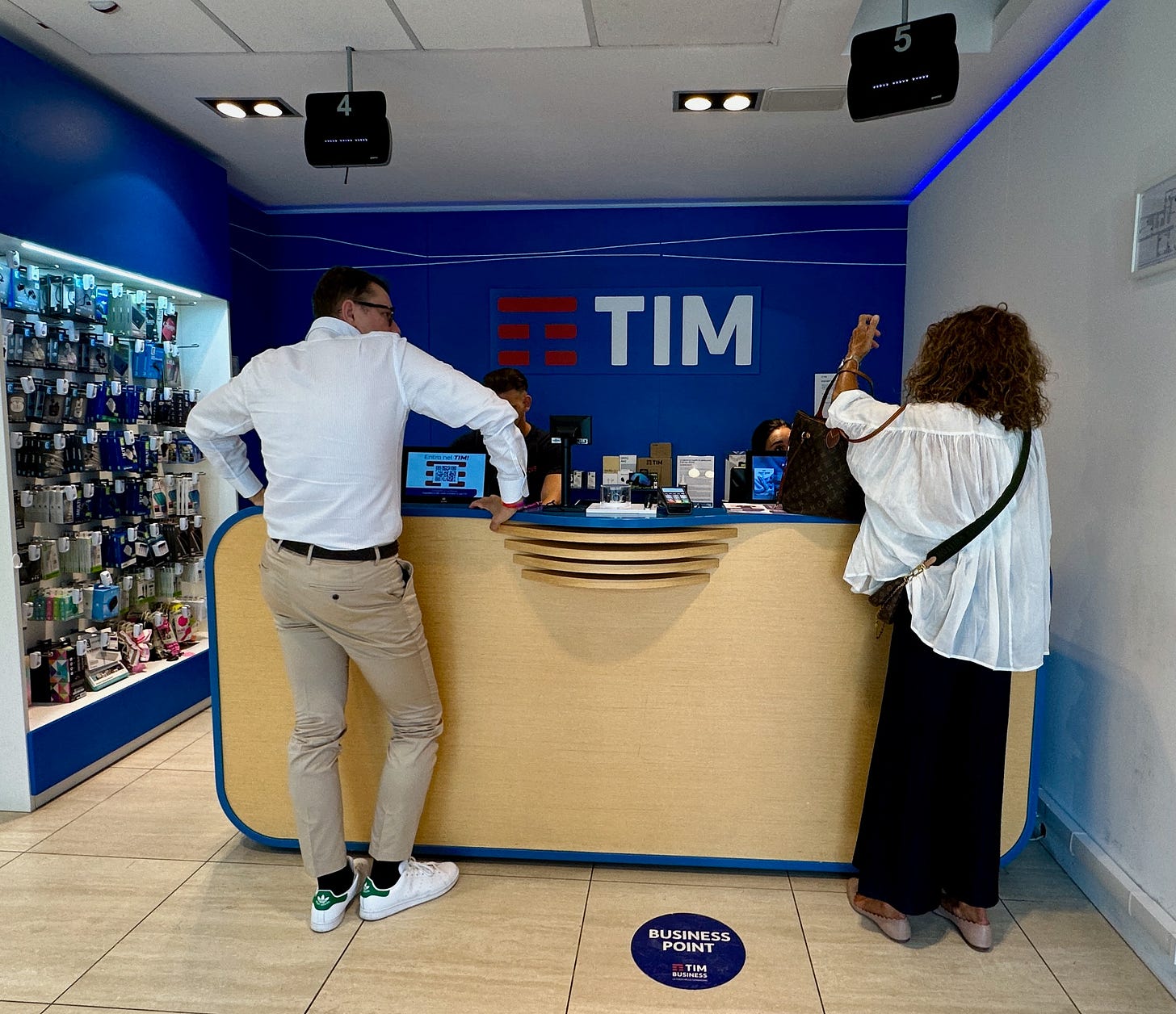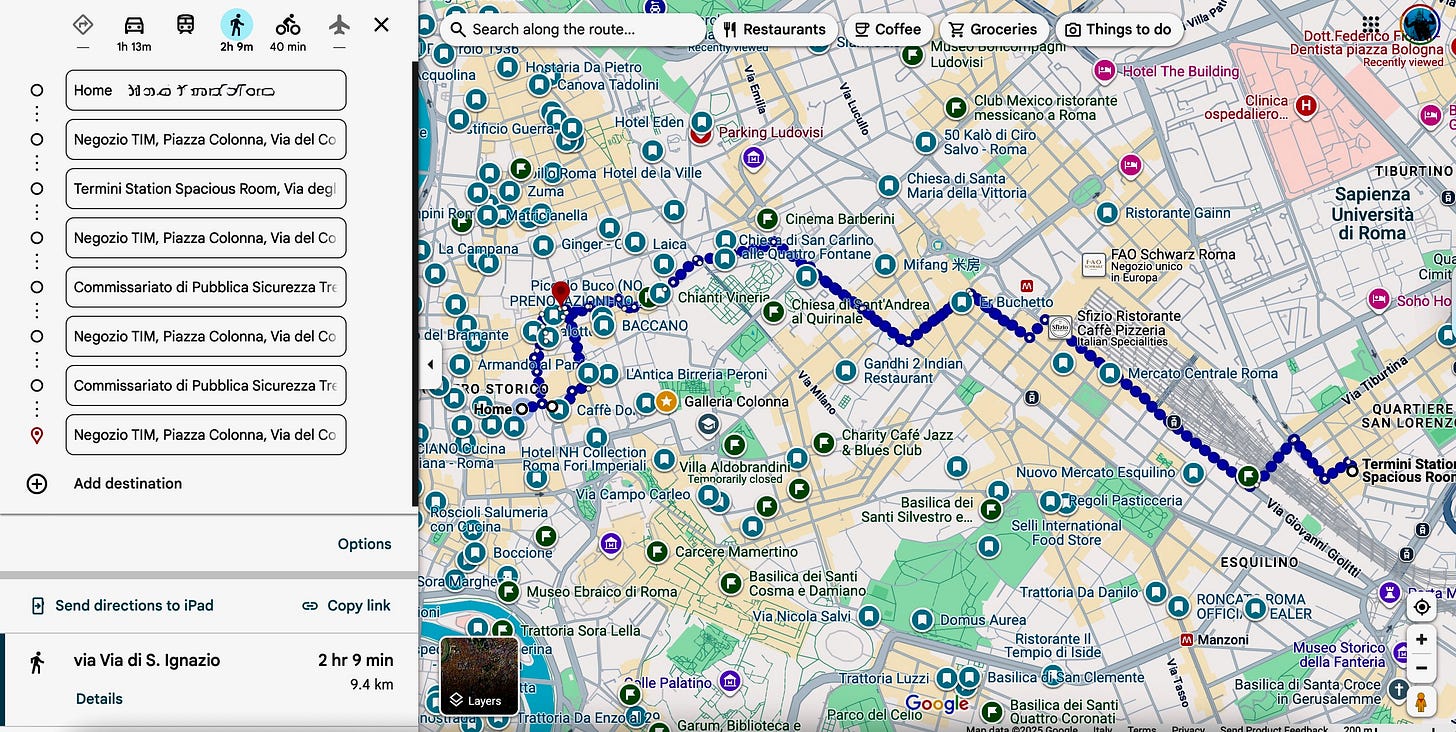How I Walked Ten Kilometers and Visited the Police Station (Twice) to Save My Italian Phone Number
(Or: How to "Get Lost in a Glass of Water")
Everyone complains about Italian bureaucracy. There’s even a local expression for the way you can get completely stuck by the tiniest, most pointless obstacle: perdersi in un bicchiere d’acqua—to get lost in a glass of water. But what does that actually look like? Try changing the eSIM on your iPhone.

My phone has two eSIMs: one American, one Italian. Switching phones with my US carrier was a 15-second task: log in, scan QR code, done. The Italian side, though, was about to take me on a cross-city odyssey worthy of a Kafka short story (or maybe Dante, if Dante had written about telecommunications).
It began with optimism. I walked to my neighborhood TIM store, thinking, “How hard can this be?” I explained I wanted to port my number to my new phone. The clerk looked at me like I’d asked her to explain quantum physics. “Do you have your original SIM card?” she asked. Not the chip—rather, the little insignificant-looking bit of paper with a QR code I’d received two years ago in another city. “You didn’t keep that?” she said, eyebrows raised.
No, I did not.

“Well, you’ll have to get a new Italian number then.” My face went pale. My immigration updates, my permesso di soggiorno—everything the Italian government officially communicates to me—arrives via text on that number. I couldn’t lose it. Surely, there was a solution? Did I have to become one of those people who carry two phones? It could not be.
The clerk frowned, thinking deeply. “Maybe the store under Termini Station,” she finally said, “they have special cards there to port the number. You can try.” She wrote the address down, as if sending me to a rarely encountered specialist.
I walked half an hour to Rome’s main train station, my hope renewed. I waited in line, rehearsed my plea, and finally reached the counter—only to be immediately shut down. “No. We’re out. Try another store.” Where? Boh.
“Boh” is an Italian word, a physical gesture, summing up resignation, despair, hopelessness. I don’t know and nobody does and maybe, anyway, it doesn’t matter.’
It’s a cultural way of letting go, of abandoning responsibility—delivered with uniquely Italian grace.
I trudged back to my local TIM store, clutching at straws. Any other ideas? “Well,” she said, with the patience of someone dealing with a particularly dim foreigner, “you could go to the police and report your card as lost. Bring us the police report and we’ll see.”
A Visit to the Police
I went to the police station—the I Distretto di Pubblica Sicurezza “Trevi Campo Marzio,” the precinct that looks after the Italian equivalent of Congress and the White House.
The officer began yelling at me. Not about me, I realized, but about TIM. He had better things to do than fill out lost SIM paperwork. Finally, he scrawled out a report, signed it, and stamped it—violently.
I brought the report back to TIM. The clerk studied it as if it were a precious artifact. “No,” she said, “this won’t do. The officer didn’t stamp over your phone number. You could have forged the number. The stamp must be on the number.”
She peered at me over her glasses, channeling centuries of bureaucratic disappointment. “You’ll have to go back and tell them to redo it.”
I pleaded. “They’re going to be so angry with me. They’re already very unhappy.”
She shrugged, giving the most Italian answer of all, the same one I’d heard at the Termini store:
“Boh.”
Back to the Station
I returned to the police station. The yelling was louder this time. A lieutenant in a cashmere sweater appeared, spoke perfect English, and asked if anything so stupid could happen in America. “We have plenty of stupidity, but not this,” I admitted.
We bonded over our favorite TV show, Commissario Montalbano. The room relaxed. The officer filled out a new form, and with an operatic sense of ceremony, stamped it directly on top of my phone number. We all shook our heads together, united in the shared absurdity of the system.
Bureaucratic Mastery
I trudged back to TIM. The clerk examined the paper, nodded with solemn approval—bureaucratic level: genius unlocked. After two minutes of typing and fiddling with my phone, it was done.
Time spent: 8 hours
Kilometers walked: 9.4
Sense of accomplishment: Priceless—if only for the story.
In Italy, bureaucracy is never about the thing itself—it’s about the next step, and then the next, and then the next. It’s about knowing which office to go to, what document to bring, whose day you’re interrupting, and how much coffee they’ve had so far. If you can survive the journey, maybe you’ll reach the other side with your dignity—and your phone number—intact.









